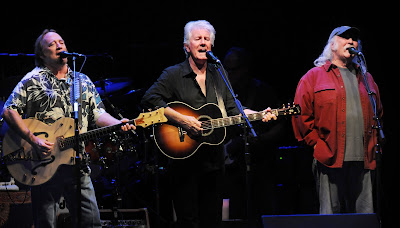 Stephen Stills, Graham Nash and David Crosby,
Stephen Stills, Graham Nash and David Crosby,at the Seminole Hard Rock on Thursday night.
(Photo by Tom Craig/Seminole Hard Rock)
By Thom Smith
Do, do, do-do, do, do, do-dah-do, do, do. Not a hint of Judy’s blue eyes. No holding anyone close before the fire. Nothing about Chicago or Ohio or Woodstock.
But with Crosby, Stills and Nash, so much water has moved underneath their bridges that no matter what or how many songs they performed at Seminole Hard Rock on Thursday night, it wouldn’t be enough for the helplessly hoping crowd.
Still, they were able to cram a lifetime of pain and glory into 100 minutes with an artistry that many modern entertainers could only hope to emulate. Sure, they’re old. Crosby may have turned 68 the week before but on Almost Cut My Hair (which he still hasn’t) he served notice that his freak flag still flies.
Stephen Stills is pushing 65, and while his voice is a bit raspier, his guitar licks (including mimicking a police siren in the same song) may be better. Nash, 67, still the stable figure in this cyclonic group, set the tone by leading off with Helplessly Hoping, joking that they would sing every song that Crosby could remember the lyrics to.
Having set the tone for an evening of oldies, Crosby immediately announced they would include songs made famous by others: the Stones’ Ruby Tuesday, James Taylor’s You Can Close Your Eyes, Dylan’s Girl From the North Country. He hinted that the group’s next project might be an album of covers, then jumped right back to their own library with Guinnevere.
The hits just kept coming, the crispness and power of Southern Cross bringing the crowd to its feet, Crosby’s voice seeming to strengthen through Long Time Gone, Stills ripping through his old Buffalo Springfield classic Rock ‘n’ Roll Woman with a faster tempo and more drive than the original.
Here’s a band that’s been together on and off for 40 years, who admitted when they took the stage at Woodstock that they were “scared —-less,” who cut many of their musical teeth in an underappreciated mid-60s pop-folk scene in Miami, who developed social sensibility in the California counterculture, who had run-ins with the law, who struggled with bad health – and still managed to not only survive but prevail.
Theirs was a show that could rekindle the fires of the “Woodstock generation” – the one in power now – and also capture the spirit and emotion of the new generation. When they sang “you’ve got to speak out against the madness,” they weren’t blowing smoke. We may have been there before, as they suggested in Deja Vu, but it wasn’t like this: Every song offered something new, be it phrasing, tempo or instrumentation, while retaining its original integrity. Nash pulled out a harmonica; Stills took at turn at the Hammond B3.
It didn’t hurt that they brought along the cream of the crop for backup musicians – veteran drummer Joe Vitale, organist Todd Caldwell, bassist Bob Glaub (originally from Hollywood, Fla.) and keyboardist James Raymond (Crosby’s son).
The music continued through Bluebird, a singalong on Our House and a screaming Wooden Ships. For an encore, two messages: Love the One You’re With and, if something results, Teach Your Children. Then a quick group bow and they were gone, three buses and a column of trucks bound for Clearwater, St. Augustine and Melbourne before finally wrapping up at the end of September in California.
They’re eligible for Social Security and Medicare, yet still ready for the next inspiration, proving again, as they so often have, that good music never grows old.
Thom Smith is a freelance writer based in South Florida.